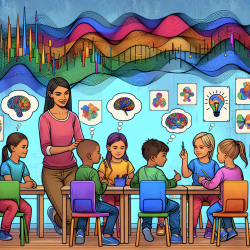As practitioners in the field of speech-language pathology, we constantly strive to improve outcomes for children with developmental language disorder (DLD). Recent research titled Declarative Learning Mechanisms Support Declarative but Not Probabilistic Feedback-Based Learning in Children with Developmental Language Disorder (DLD) provides valuable insights that can guide our therapeutic approaches.
Understanding Feedback-Based Learning in DLD
The study explored how children with DLD process feedback during learning tasks and found significant differences in their ability to use feedback compared to typically developing (TD) children. The research identified two types of learning mechanisms: declarative learning, supported by the medial temporal lobe (MTL), and probabilistic learning, governed by the striatum.
Key Findings
- Children with DLD performed poorer in both declarative and probabilistic learning tasks compared to their TD peers.
- Enhanced MTL activation (N170 event-related potential) was associated with better performance in declarative tasks for children with DLD.
- Striatal-based feedback processing (FRN event-related potential) was less pronounced in children with DLD, particularly in probabilistic tasks.
Implications for Practice
These findings suggest that children with DLD benefit more from declarative learning mechanisms. Here are some practical steps to implement these insights:
- Focus on Declarative Learning: Incorporate more declarative learning tasks, such as rote learning and repetition, which leverage the MTL system. Activities that involve explicit instructions and clear, immediate feedback can be particularly effective.
- Adjust Feedback Strategies: Given the difficulties children with DLD have with probabilistic learning, minimize tasks that rely heavily on incremental feedback. Instead, provide deterministic feedback that can be immediately applied to improve learning outcomes.
- Monitor and Adjust Interventions: Use tools like event-related potentials (ERPs) to monitor neural responses to feedback. This can help tailor interventions to each child's specific learning profile.
Encouraging Further Research
While this study provides significant insights, it also highlights the need for further research. Practitioners are encouraged to explore how different types of feedback and learning mechanisms can be optimized for children with DLD. Collaborative research efforts can lead to the development of more effective therapeutic interventions.
To read the original research paper, please follow this link: Declarative Learning Mechanisms Support Declarative but Not Probabilistic Feedback-Based Learning in Children with Developmental Language Disorder (DLD).










